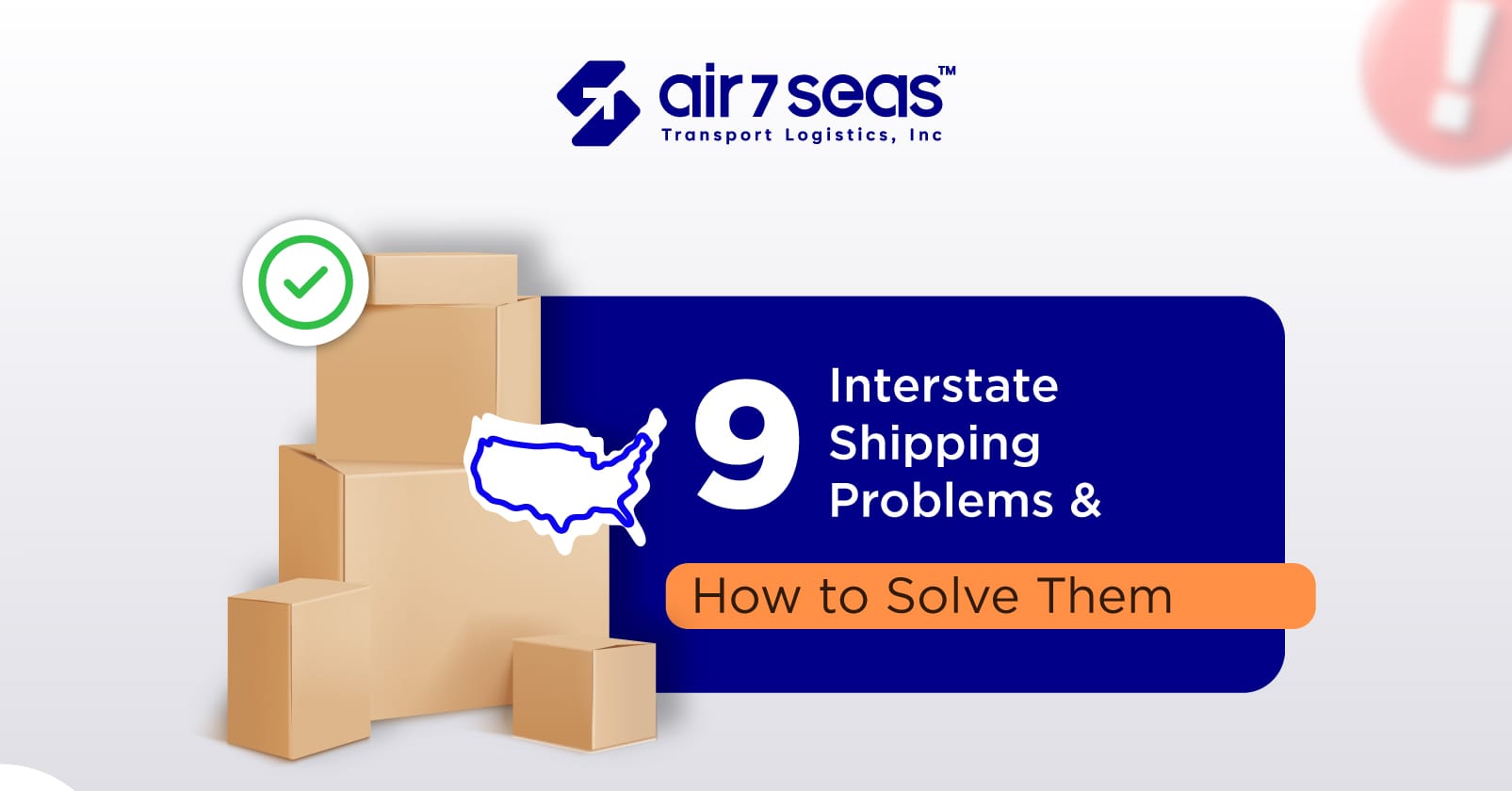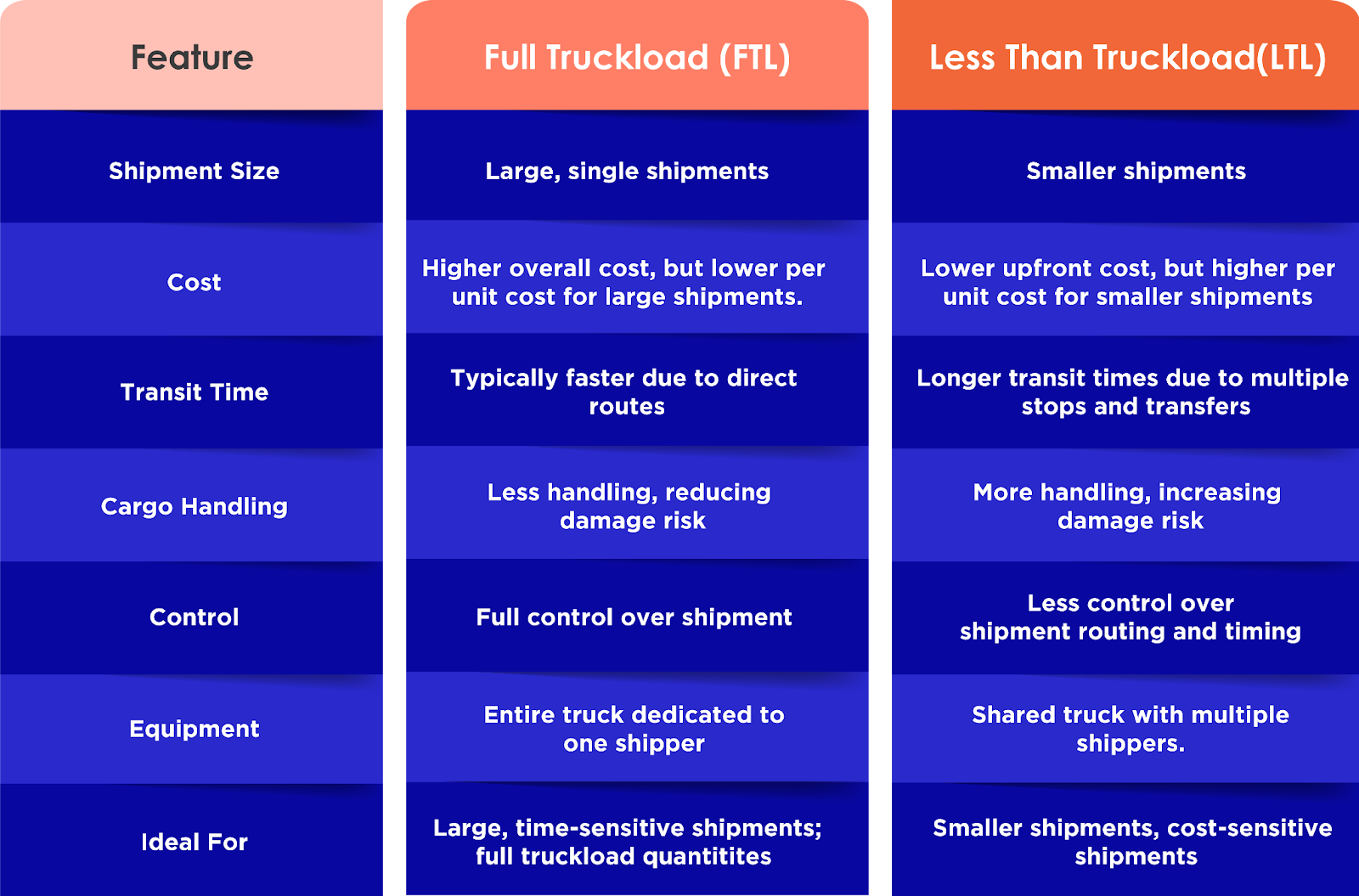
Thinking about shipping your household or commercial goods within the U.S.?
Not sure whether to go with FTL or LTL?
Or maybe you're getting slapped with charges you can’t even figure out?
That “affordable” shipment can suddenly turn into a budget-buster real quick.
Don’t worry!
We’ve got your back. In this blog, we’ll break down the most common challenges people face during interstate moves and more importantly, how to avoid them.
Interstate shipping problems Include
Shipping from one state to another within the USA is not easy. To make it easy you gotta know the challenges it comes with.
Incorrect mode of transportation
- One of the first things that can trip you up is figuring out how to ship your goods. Should you go with FTL (Full Truckload), LTL (Less Than Truckload), or Parcel?
- It might seem straightforward, but choosing the wrong mode can lead to damaged goods, delays, or paying way more than you need to.

Hidden Costs and Surprise Charges
- Did you even think only international shipments come with hidden charges?
- If yes, I'm sorry, shipping with the USA can also hit you with hidden charges.
- At first you might feel like “Wow, that’s a great rate!” only to get the final invoice and wonder where all the extra fees came from?
- This case occurs especially if you’re booking directly with a carrier or using an online tool without guidance.
The surprises charged might include
- Accessorial fees for liftgate, inside delivery, or limited access locations
- Fuel surcharges added on top of quoted rates
- Reweigh/reclass charges due to incorrect weight or freight class
- Detention fees for late loading/unloading
- Redelivery charges for missed delivery attempts
- Extra costs due to improper or non-compliant packing
Improper packing
- Bitter truth - no matter how reliable your carrier is, bad packaging can ruin your shipment.
- We’ve seen it all, boxes crushed under heavier freight, items sliding around on loose pallets, shrink wrap barely holding together.
- When goods aren’t packaged properly, they’re at a much higher risk of getting damaged in transit.
- For smart packing advice check
Shipping partner flaw
- Just because a carrier can move freight doesn’t mean they’ll move it well.
- Some carriers pride themselves on on-time performance, low damage rates, and proactive communication at very low Cheap rates.
- But if your goods show up late, damaged, or not at all, was it really worth the few bucks you saved?
Transit Delays
- You booked your shipment. The carrier gave you a delivery window. Everything’s on track… until it’s not.
- The truth is, delays in state-to-state shipping happen more often than most people expect. And they’re not always in your control.
Here’s what can slow things down:
- Severe weather conditions like snow, storms, or heavy rain
- Highway traffic and accidents
- Truck and driver shortages, especially during peak seasons
- Terminal congestion, particularly in LTL shipping
- Mechanical issues or breakdowns mid-route
- Missed appointment windows at delivery sites
Paperwork Mistakes
It might seem like they are papers, why will that be so important? You got it wrong, one wrong paperwork can ruin your entire business.
Even small errors, like a typo in the delivery address or the wrong freight class on the Bill of Lading (BOL) can trigger a chain reaction of problems:
- Paperwork Mismatch
- Freight held at terminal
- Reclassification fees
- Lost or misrouted shipments
- Denied claims
- Delayed delivery
- Missed pickups due to missing documents
Limited Pickup/Delivery Challenges
If you're shipping to or from rural areas, residential neighborhoods, job sites, schools, or gated facilities, here’s what can go wrong:
- Carriers may refuse service if the location isn’t truck-accessible
- Delays due to scheduling issues or limited time windows for delivery.
- Extra fees for liftgate services, inside delivery, or navigating restricted areas.
- Missed deliveries if no one is available to receive or assist with unloading.
- Redelivery charges if the first attempt fails due to access limitations.
No insurance
- Many shippers assume nothing will go wrong, until it does. Skipping freight insurance can turn a simple delay or damage into a costly loss.
- Here's what you risk:
- No coverage for lost or damaged goods
- Full liability falls on the shipper
- Claims denied or only partially compensated
- Financial loss with no recovery option
- Delays in claim processing without proper coverage
Choosing the wrong interstate moving companies
- When selecting an interstate moving company, it’s important to choose wisely.
- There are many moving companies across the United States, but not all of them provide reliable or trustworthy service for transporting your household goods.
- Making the wrong choice can lead to delays, damage, or even loss of your belongings.
How to Avoid Interstate Shipping Challenges
Avoiding costly shipping mistakes doesn’t require a complicated strategy, it just takes some awareness and the right steps before booking.
Here's how to stay ahead:
- Understand your shipment size and choose the correct mode (Parcel, LTL, or FTL)
- Provide accurate weight, dimensions, and freight class to avoid reweigh and reclass fees
- Maintain a Clear and Accurate Inventory List
- Ensure proper packaging, especially for LTL or fragile items
- Confirm whether your pickup or delivery location needs special equipment or access
- Double-check all paperwork, especially the Bill of Lading
- Don’t skip freight insurance if your goods are valuable or time-sensitive
- Work only with shipping companies that are DOT registered and compliant with federal regulations.
- Work with a reputable company who can help you with all the services like navigate quotes, carriers, and compliance
Shipping doesn’t have to be risky, it just needs to be handled right from the start.
Still Have Questions? We’re Here to Help
With 40 years in the international freight forwarding industry, we’ve handled 1M+ Last mile delivery within the United States and have handled every challenge the supply chain can throw.
From packaging at customer places to delivering at their door step, our team offers reliable service for the customer at a very budget friendly price.
When you work with us, you’re backed by decades of hands-on experience and dependable support, every step of the way.
Frequently Asked Questions
- What DOT compliance requirements apply to interstate freight shipping?
Interstate shipments must comply with Department of Transportation (DOT) regulations including proper freight classification, accurate weight declarations, hazardous materials documentation (if applicable), driver hours of service rules, and vehicle safety standards. Non-compliance can result in fines and shipment delays.
- Do I need customs documentation for interstate shipping within the US?
No, customs documentation is not required for domestic interstate shipping within the United States. However, you still need proper freight documentation like a Bill of Lading (BOL), commercial invoices for business shipments, and accurate freight classification to ensure compliance with DOT regulations.
- Do I need freight insurance for domestic shipping?
Yes, freight insurance is highly recommended. It protects your goods against loss or damage, especially during long-distance or high-value shipments.
- How can I avoid shipping delays when moving freight between states?
To minimize delays, choose reliable carriers with good on-time performance, provide accurate pickup/delivery information, ensure proper packaging, double-check all paperwork, plan for weather-related delays, and consider peak season impacts on transit times.
- What’s the difference between FTL, LTL, and Parcel shipping?
FTL (Full Truckload) is best for large shipments that fill a truck. LTL (Less Than Truckload) is cost-effective for smaller loads. Parcel is ideal for small packages under 150 lbs.

